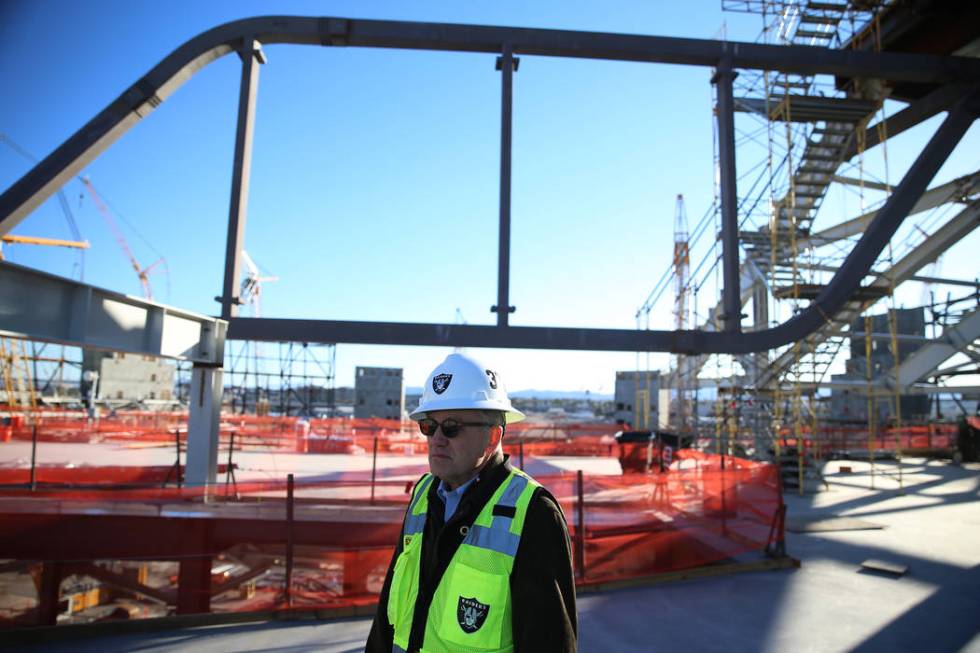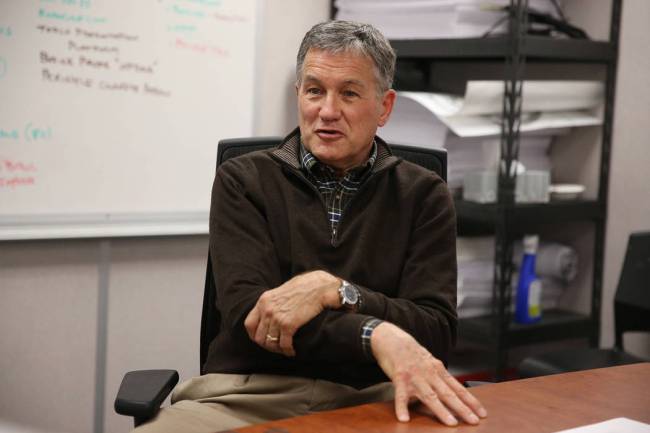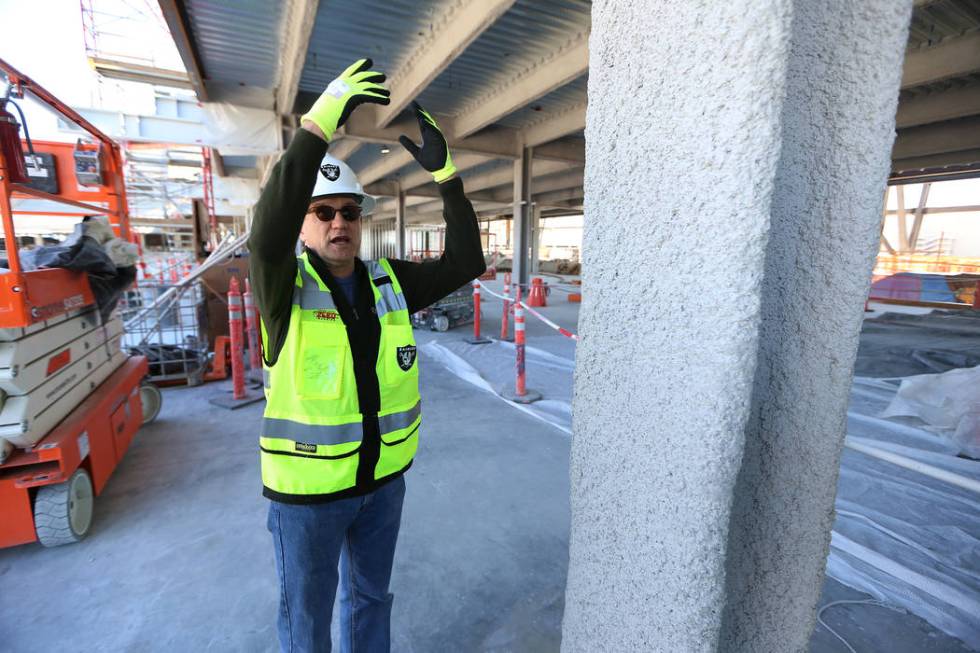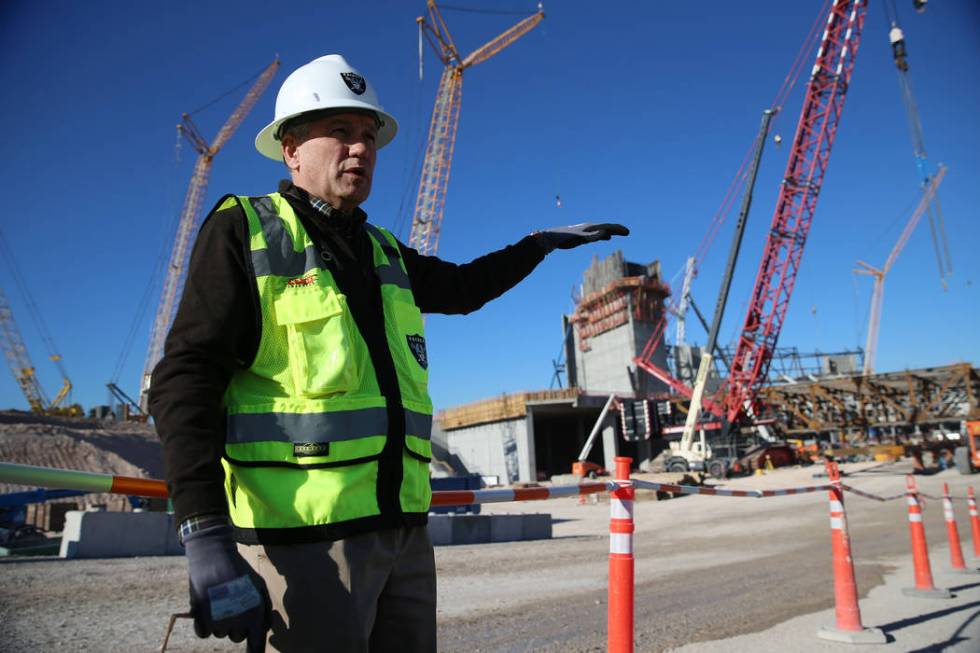Mark Davis makes a significant point: The Raiders didn’t entrust the building of their state-of-the-art palace, their 65,000-seat jewel in the desert, their shiny and spectacular $1.9 billion soon-to-be new home to Don Webb because he knows what’s best to call on third-and-goal from the 10.
“I don’t know if Don knows anything about football,” said Davis, team owner and someone who has known Webb for decades. “But stadiums are different than sports. All the components and dynamics and people who work on building a stadium might not know a damn thing about football or the guy next to them, but they know what they’re doing and how to do their specific job.
“My dad (the team’s late owner Al Davis) trusted him and that means a lot. You know, Don is an enigma, a very quiet guy who goes about his job and knows what he’s doing. But who he is? I couldn’t tell you.”

It’s a common representation given by those who work closest to and with Webb, the chief operating officer for Stadium Event Co., and leader among many in constructing the NFL stadium set to open here in July 2020. The year-out countdown has begun, meaning those time lapses that have allowed the public to watch each step of the stadium being raised from the dirt are about to become extremely busy and detailed.
All the while, the 66-year-old Webb thinks far more about canopy trusses and aesthetic benefits — not to mention a certain completion deadline — than he does about how the Raiders are going to stop Patrick Mahomes and Philip Rivers.
You can make an argument, given the team’s defense of late, his job might be easier.
“Al Davis once said that I was a smart guy who didn’t know whether a football was stuffed or inflated,” Webb said. “He wasn’t far off. He was a wise man. Even though I don’t have an affinity for football, the ironic thing is I’m a senior vice president of an NFL team and most of them know I don’t know anything about football. They laugh at me for it.
“But here’s the thing: A stadium is not just a structure of concrete and glass and steel. We are building a future experience that is multigenerational. A young child that comes and holds the hand of their mother or father for a game, years later, may not remember who played, let alone who won. But they will remember the smell of the grass and the ambiance of the crowd and the cheering. They will remember experiencing something very special.
“That’s what motivates me. It’s not the outcome of a game — although in my position, I should be invested in that also — but rather the broader experience of what we’re building.”
Not a talker
He looks the part of a college professor. Or perhaps a doctor.
Studious. Sport coat. Slacks. Open collar.

Measured in his speech. Determined in his walk. Fit.
Really, really measured in his speech.
Webb spends parts of his downtime, what there is of it right now, cycling roads in Las Vegas.
He’s big into that. Loves to bike.
He looks the part of, well, a guy who’s in charge of building big and important things — like he should perpetually exist with a set of blueprints attached to his hip, or at least always be holding the iPad that includes such designs.
Webb declined several interview requests for this story before speaking for a few minutes outside a Stadium Authority Board meeting a few weeks ago. His reason for not talking in length: There are, at any time, 1,500 workers on site, and Webb was against a narrative that featured or credited him an ounce beyond any of them.
“We still have a long way to go before anyone should be taking credit for success,” Webb said. “Those workers, in the recesses of their minds, their subconscious, know they’re not just building a hospital or school or shopping mall, all of which are really worthwhile projects. They know they’re building a legacy project that they’re going to want to take their grandchildren to some day. Each one plays as big a part in this as the next person.
“You don’t really think that about a hospital or an apartment complex when you build an NFL stadium. You’re building something that will last. I think that inspires our entire workforce.”
Here’s the thing: A stadium is not just a structure of concrete and glass and steel. ... A young child that comes and holds the hand of their mother or father for a game, years later, may not remember who played, let alone who won. But they will remember the smell of the grass and the ambiance of the crowd and the cheering. They will remember experiencing something very special.
Don Webb
Also declining comment was Terry K. Miller, consulting project manager for the expansion and renovation of the Las Vegas Convention Center and principal owner and partner with Webb at Cordell Corporation, a California-based company that specializes in managing the development and renovation of high-profile public facilities.
Webb’s preference for privacy, for any detailed account of his career or personal life with wife, Anne, and the family they raised, much of that time in Sacramento, is both protected and respected by friends and colleagues alike.
They know he is guarded, and respond in much the same manner when asked about him.
It’s not as though Webb doesn’t speak to the media, but his comments are almost always specific to stadium construction. For this, he has been featured in a series of short films produced by the Raiders titled, “From The Ground Up.”
“I’m glad that Don doesn’t talk much,” Davis said. “I want him focused on the work. I’m not going to give you a ‘He’s so great at building a stadium’ just yet. I’ll know that when we see how things look on game day and the day after.
“This stadium has been my dream, my family’s dream, so we want everything to be perfect. It’s not like I micromanage. I don’t tell people when they’re doing great jobs. I’ll compliment some days. But moreso, I bring attention to things that could pose potential problems. We’re going to have the most dynamic stadium anywhere, but there are going to be things we miss.
“And with Don, I know those things will be fixed.”
It’s all about history, is why.

‘Someone we trust’
Webb sat opposite the Raiders in the mid-1980s, when he helped negotiate a lease for the team’s home at the Los Angeles Coliseum, but he would later become intimately involved with the franchise by overseeing the emergency restoration of the structure following the Northridge Earthquake in 1994.
He then oversaw a major expansion of the Oakland Coliseum upon the team’s return to the Bay Area the following year.
“He’s someone we know, someone we trust, someone we have been through this process (with) before,” said team president Marc Badain, who, more than anyone in the organization, has worked closest with Webb. “Over the last 25 years, we had a number of conversations about what the future might look like and what a future building would look like. So when this project started to surface, he was a logical phone call to make and we’re glad he was available.”
“Football is just not his passion, (but that’s) not important for him to do a great job building this stadium. One has nothing to do with the other. He’s a tremendous family man, a tremendous person, a tremendous friend, someone you can rely on and trust.
“Don is also incredibly funny. I know he doesn’t show it, but he has a tremendous sense of humor — as dry as it gets.”
Badain is right. Webb doesn’t show it much.
But how adept he is at delivering one-liners means nothing to the Raiders, who instead trust his resume, which is beyond extensive.
Prior to founding Cordell, Webb was a founding executive of Spectacor Management Group and responsible for “development efforts through acquisition, real estate and capital leasing of sports, convention, entertainment and recreation facilities.”
He also developed financing plans for major stadium and arena development and acquisition efforts, along with professional sports franchise acquisitions and facility improvements.
He has been there, done that, negotiated and built pretty much anything and everything.

“An amazing individual, salt of the earth,” said Paul Dudzinski, project director for the McCarthy Building Co., of Henderson, part of the Raiders stadium construction team. “Don is as level-headed a person as you will find in this business. So organized. So calm under pressure. He can deal with the smallest and largest of issues and somehow makes time for all of them.”
The final word
The most recent meeting of the Stadium Authority Board was 30 minutes from starting, and Webb carefully scanned those documents he would be addressing.
His is the final word that board members seek, whether it be updates on traffic plans or the installation of 13 rails on which a field tray will be guided into the building for games or how an increased budget will benefit the fan experience because sales of suites, personal seat licenses, club seats and sponsorships have exceeded anticipated amounts.
They want all the good and bad news at once about the historic project at Russell Road and Interstate 15.
Maybe because they know the expectations of a certain team owner are just as high, if not higher.
“To me, Monday morning will be as important as Sunday afternoon,” Davis said. “That’s because our fans will have gone to the event, seen the stadium, and what is their reaction going to be? Did they have a great time or will they say, ‘This place is a piece of crap and everything is terrible.’ That’s what I tell all the people working on this stadium — think about Monday morning.
“When that time comes, I’ll know what kind of job Don Webb did building it.”
Contact columnist Ed Graney at egraney@reviewjournal.com or 702-383-4618. He can be heard on “The Press Box,” ESPN Radio 100.9 FM and 1100 AM, from 7 a.m. to 10 a.m. Monday through Friday. Follow @edgraney on Twitter.













